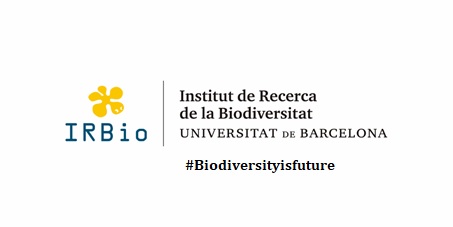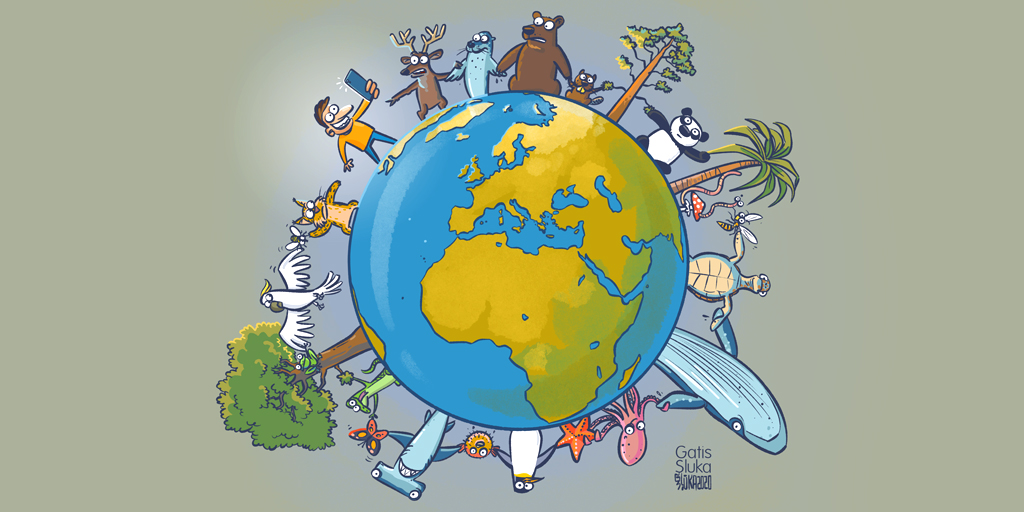10-12-2020
The Biodiversity Research Institute of the University of Barcelona (IRBio), first European research center to join European Commission’s Global Coalition “United for Biodiversity”
Global Coalition: United for Biodiversity. Image credit: Gatis Šļūka
We are proud to announce IRBio becomes officially the 1st research institute from Europe and second worldwide to join the Global Coalition “#UnitedforBiodiversity”. Launched by EU Commissioner for Environment Virginijus Sinkevicius on the occasion of the World Wildlife Day 2020, the Coalition calls on all museums, national parks, zoos, aquariums, botanic gardens and research institutions to join forces in raising the alarm about the nature crisis and the need to protect biodiversity, ahead of the crucial CoP 15 of the Convention on Biological Diversity in 2021.
We are proud to announce IRBio becomes officially the 1st research institute from Europe and second worldwide to join the Global Coalition “#UnitedforBiodiversity”. Launched by EU Commissioner for Environment Virginijus Sinkevicius on the occasion of the World Wildlife Day 2020, the Coalition calls on all museums, national parks, zoos, aquariums, botanic gardens and research institutions to join forces in raising the alarm about the nature crisis and the need to protect biodiversity, ahead of the crucial CoP 15 of the Convention on Biological Diversity in 2021.
With this announcement, IRBio adds its voice to 5 institutions from Spain, including the Museu de Ciències Naturals and Jardí Botànic de Barcelona, and dozens across the world, as the São Paulo zoo, Bristol museum and the Nature Conservation Center of the American University of Beirut. All of us signed the pledge of the Coalition and call on world leaders to agree on an ambitious post-2020 biodiversity framework to protect and restore world ecosystems, not only in the goals and targets set, but also in providing the means, financial and otherwise, to achieve those goals, and in the mechanisms put in place to review progress.”.
There is no future for humanity without biodiversity
According to the latest report of the Intergovernmental Panel on Biodiversity and Ecosystem Services (IPBES), an estimated 135 species of plants, animals and insects are lost every day. That is 50,000 species a year, nearly one million species in a few decades. This, added to the report of the Intergovernmental Panel on Climate Change (IPCC - 2018) on global warming of 1.5 ° C, establishes the need to reduce global emissions by around 50% in the next 10 years and achieve zero clean emissions by 2050.
The Biodiversity Research Institute of the University of Barcelona, IRBio, generates fundamental knowledge about the structure and functioning of ecosystems, and our research is directly or indirectly related to aspects of well-being such as health, climate change, food security and the availability of clean water. Without biodiversity there is no capacity for development, and consequently it will affect the wellbeing of our society and compromise the future of young people and next generations.
IRBio is composed of more than 200 specialists in different research areas, bringing together academics, young researchers and collaborators working in a wide variety of research from genome to ecosystem. Their work is carried out on all main terrestrial, freshwater and marine ecosystems. The research perspectives are equally broad, from genomes to ecosystems and use morphological, molecular, biogeographical, quantitative and bioinformatics approaches. We are proud to bring our expertise to the partners of the Coalition.
IRBio: science, research and social awareness for a greener future
The Institute promotes high quality research and improve social dissemination about the relevance of biodiversity and its preservation, to increase public awareness about conservation issues and sustainable development. Additionally, IRBio provides scientific advice on biodiversity (and paleobiodiversity) (e.g. management, evaluation, education, legislation) to public administrations, private agencies, and environmental organizations, and develops technical reports on environmental issues.
In 2017, IRBio scientists signed the Manifest "Scientists 'Warning to Humanity: A Second Notice". These scientists concerned about the state of the planet Earth called on humanity to reduce environmental destruction and pointed to the need for a major change in our management of the Earth and its life if human misery is to be avoided.
We need to take effective and urgent measures to halt the continued loss of wildlife in order to have resilient ecosystems that continue to provide natural ecosystem services. Ensuring the variety of life on Earth is vital not only human well-being and poverty reduction, but also to ensure the persistence of healthy and functioning ecosystems around the world.
COVID-19: lessons to learn about destruction of natural habitat
The current Covid-19 global issue, caused by the transmission of a virus or disease from animals to humans (zoonosis), is an alert about the global changes we humans are causing on our planet. Global warming, the destruction and modification of natural habitats and the movement of people and goods, increase the frequency of transmission of animal diseases to people and as a result of likelihood of them becoming pandemics.
Global climate, food, ecological and health emergencies have their origin in the fracture of the relationship between human and nature, in which the current economic model and food consumption patterns have a large part of the responsibility. We need to work on promoting nature-based solutions, sustainability and green models. The challenge for society lies in promoting the transformation of nature-based model to achieve global environmental sustainability and restore nature. In this context, IRBio has shown a firm commitment to nature conservation and protection by boosting research activity and social dissemination of knowledge about COVID-19 disease caused by coronavirus.
We are stronger together
As the Coalition aims at gathering 500 members ahead of the CoP15, we encourage all Catalan, Spanish and world institutions to join the movement. Let’s explain to all the importance of biodiversity for our future and contribute to a successful CoP15.
Interested institutions can contact: ec-biodiversity-coalition@ec.europa.eu
Coalition website: https://ec.europa.eu/environment/nature/biodiversity/coalition/index_en.htm
#Biodiversity #Biodiversidad #Biodiversitat #CoP15 #UnitedforBiodiversity #UnidosporlaBiodiversidad #UnitsperlaBiodiversitat #Biodiversityisfuture

